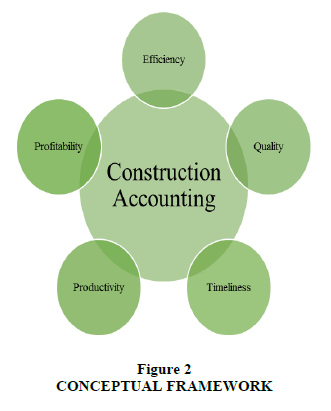Why Construction Accounting is Crucial for Long-Term Business Growth
Why Construction Accounting is Crucial for Long-Term Business Growth
Blog Article
Secret Providers Offered in Building Accountancy to Boost Financial Oversight
In the world of construction accounting, crucial services such as job expense estimation, budget plan administration, and cash circulation evaluation play an important role in boosting financial oversight. Understanding these subtleties can significantly influence the effectiveness of economic oversight in building and construction tasks.
Project Expense Evaluation
Reliable job expense estimate is a critical component of effective building audit services, as it directly impacts budgeting and economic preparation (construction accounting). Exact expense price quotes give an extensive introduction of the economic requirements for a construction project, making it possible for stakeholders to make informed decisions concerning resource allocation and project expediency
An extensive expense estimation process includes numerous aspects, including labor, products, devices, overhead, and backups. By assessing historic data and present market patterns, building accountants can establish practical price quotes that show real job costs. This analytical strategy not only aids in safeguarding financing however additionally improves transparency and liability among all parties entailed.
Additionally, exact expense estimate serves as a foundation for monitoring and regulating expenses throughout the project's lifecycle. By developing a clear standard, building and construction accountants can determine inconsistencies between estimated and real prices, permitting for timely adjustments and treatments.
Inevitably, efficient project expense evaluation not only facilitates smoother job execution yet likewise reinforces the overall monetary wellness of building companies, ensuring they continue to be competitive in a progressively dynamic sector. This calculated technique underscores the importance of skilled experts in delivering exact and reputable expense quotes.
Spending Plan Administration
In the realm of building audit services, budget plan administration plays a pivotal function in ensuring that projects stay economically viable and on course. Effective budget plan management includes the systematic planning, surveillance, and controlling of project expenses to align with monetary goals. It starts with the development of a comprehensive budget plan that precisely reflects the expected expenses of labor, materials, tools, and expenses based upon comprehensive job price estimation.
As soon as the budget plan is established, recurring tracking is crucial. This includes regular evaluations of actual expenditures versus the budgeted numbers, permitting prompt identification of inconsistencies. By executing devices and software tailored for building and construction audit, project supervisors can produce real-time reports that assist in notified decision-making.
In addition, aggressive budget management enables stakeholders to adjust monetary appropriations and sources as needed, promoting adaptability in response to unpredicted obstacles. This versatility is critical in the construction industry, where job extents can regularly transform. Eventually, robust budget administration not just reinforces economic accountability but likewise enhances overall project efficiency, ensuring effective completion within the allocated monetary criteria.
Cash Money Circulation Evaluation
Cash circulation analysis functions as a vital part of building and construction accountancy, making it possible for job managers to keep a clear understanding of the inflow and discharge of funds throughout the project lifecycle. This logical procedure permits the identification of possible cash money lacks or surpluses, empowering supervisors to make informed choices concerning budgeting and source appropriation.
By carefully tracking money inflows from client repayments, finances, and other revenue check my reference sources, along with keeping an eye on outflows such as labor, products, and overhead expenses, task managers can create a detailed capital projection - construction accounting. This forecast not just help in forecasting future financial positions but additionally helps in determining trends that may influence project viability
Routine capital evaluation assists in prompt treatments, permitting project supervisors to deal with financial challenges before they rise. This positive strategy can reduce risks related to delayed settlements or unexpected expenditures, eventually leading to even more successful task completions. Reliable cash circulation administration contributes to keeping solid connections with subcontractors and suppliers by making certain timely repayments.
Basically, capital analysis is a vital tool in construction bookkeeping, driving economic stability and functional effectiveness throughout the period of construction jobs.
Regulatory Conformity Assistance
Governing conformity assistance is essential important link for building and construction companies navigating the complex landscape of market regulations and requirements. The building and construction market is subject to a myriad of neighborhood, state, and government policies, consisting of security standards, labor laws, and ecological standards. Non-compliance can lead to considerable fines, hold-ups, and reputational damages.
A durable conformity support system aids companies remain notified regarding appropriate guidelines and ensures that they execute required policies and treatments. This consists of monitoring modifications in legislation, giving training for staff members, and conducting normal audits to examine compliance levels. Building accounting professionals play a critical duty in this process, offering experience to interpret regulations and line up financial methods as necessary.
Moreover, regulatory compliance assistance includes the preparation and entry of needed documentation, such as tax filings and reporting for labor standards. By establishing a proactive conformity technique, building firms can minimize dangers connected with non-compliance, improve operational efficiency, and promote a society of accountability.
Ultimately, reliable regulatory compliance assistance not only safeguards a building and construction company's economic health yet additionally strengthens its reputation in the industry, placing it for lasting growth and success.

Financial Reporting and Insights
While browsing the intricacies of the building and construction sector, precise economic coverage and informative analysis are essential for informed decision-making. Building tasks frequently involve substantial funding financial investment and rising and fall prices, making it essential for stakeholders to have access to prompt and clear financial information. Detailed financial records, including revenue and loss declarations, capital estimates, and equilibrium sheets, give a snapshot of a firm's economic health and performance.
Additionally, customized understandings originated from these records aid supervisors determine trends, evaluate job earnings, and make strategic changes to boost operational efficiency. Key efficiency indications (KPIs) particular to building-- such as task margins, labor costs, and above ratios-- provide beneficial criteria for evaluating success and forecasting future performance.
Furthermore, regular economic reporting allows compliance with contractual responsibilities and promotes openness with stakeholders and capitalists. By leveraging his response innovative accountancy software and information analytics, building and construction companies can enhance their financial oversight, enabling them to browse uncertainties better. Eventually, robust financial coverage and actionable understandings equip building and construction business to make enlightened choices that advertise development and sustainability in a highly affordable market.
Conclusion

In the realm of construction accounting, vital solutions such as project price estimate, spending plan monitoring, and cash money circulation evaluation play a critical duty in improving financial oversight. Inevitably, robust spending plan monitoring not just bolsters economic accountability but additionally boosts general task performance, making sure successful completion within the designated economic specifications.

Report this page